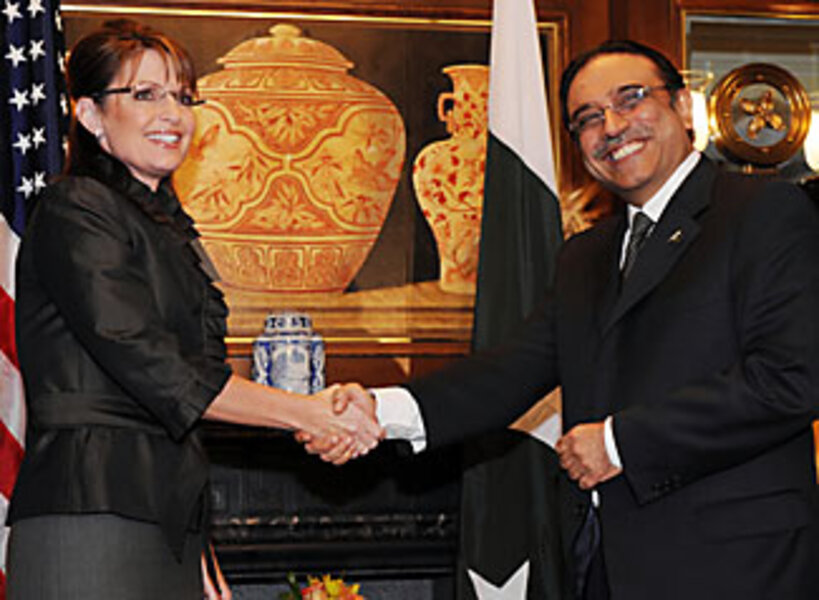Flirting with Palin earns Pakistani president a fatwa
| Lahore, Pakistan
After the flirtation came the fatwa.
With some overly friendly comments to Gov. Sarah Palin at the United Nations, Asif Ali Zardari has succeeded in uniting one of Pakistan's hard-line mosques and its feminists after a few weeks in office.
A radical Muslim prayer leader said the president shamed the nation for "indecent gestures, filthy remarks, and repeated praise of a non-Muslim lady wearing a short skirt."
Feminists charged that once again a male Pakistani leader has embarrassed the country with sexist remarks. And across the board, the Pakistani press has shown disapproval.
What did President Zardari do to draw such scorn? It might have been the "gorgeous" compliment he gave Ms. Palin when the two met at the UN last week during her meet-and-greet with foreign leaders ahead of Thursday's vice presidential debate with opponent Sen. Joe Biden, the Democratic vice presidential nominee.
But the comments from Zardari didn't end there. He went on to tell Palin: "Now I know why the whole of America is crazy about you."
"You are so nice," replied the Republican vice presidential hopeful, smiling. "Thank you."
But what may have really caused Pakistan's radical religious leaders to stew was his comment that he might "hug" Palin if his handler insisted.
Though the fatwa, issued days after the Sept. 24 exchange, carries little weight among most Pakistanis, it's indicative of the anger felt by Pakistan's increasingly assertive conservatives who consider physical contact and flattery between a man and woman who aren't married to each other distasteful. Though fatwas, or religious edicts, can range from advice on daily life to death sentences, this one does not call for any action or violence.
Last year, the mosque that issued the fatwa, Lal Masjid (Red Mosque) in Islamabad, condemned the former tourism minister, Nilofar Bahktiar, after she was photographed being hugged by a male parachuting coach in France.
Clerics declared the act a "great sin" and, though less vocal about it, similar sentiments were shared by many among Pakistani's middle classes. The Red Mosque gained international infamy in July 2007 after becoming the focal point of a Pakistan Army operation.
For the feminists it's less about cozying up to a non-Muslim woman and more about the sexist remarks by Zardari.
"As a Pakistani and as a woman, it was shameful and unacceptable. He was looking upon her merely as a woman and not as a politician in her own right," says Tahira Abdullah, a member of the Women's Action Forum.
Dismissing the mosque's concerns as "ranting," she, however, adds: "He should show some decorum – if he loved his wife so much as to press for a United Nations investigation into her death, he should behave like a mourning widower," in reference to former Pakistani premier Benazir Bhutto, a feminist icon for millions of Pakistani women.
The theme of decorum was picked up by English daily Dawn, whose editorial asked: "Why do our presidents always end up embarrassing us internationally by making sexist remarks?"
The incident bears some resemblance to yet another charm offensive by a senior Pakistani politician. Marcus Mabry's biography of Condoleezza Rice includes a passage in which he relates a meeting between former Pakistani Prime Minister Shaukat Aziz and Ms. Rice, in which Mr. Aziz was said to have stared deeply into the secretary of State's eyes and to have told her he could "conquer any woman in two minutes."
There are some, however, who see things as having been blown out of proportion.
"It was a sweet and innocuous exchange played as an international incident on Pakistani and rascally Indian front-pages with one English daily [writing] it in a scarlet box, half-implying Mrs. Palin would ditch Alaska's First Dude and become Pakistan's First Babe. As if," wrote columnist Fasih Ahmed in the Daily Times.
For most, it will soon be forgotten in a country dealing with terrorism, rising food prices, and a struggling economy. "We don't care that much how they [politicians] behave – what really matters is keeping prices down," says Nazeera Bibi, a maid in Lahore.





